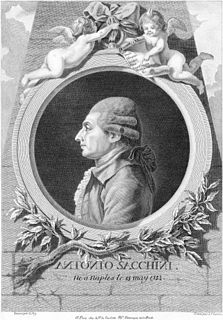| Look up Armida in Wiktionary, the free dictionary. |
Armida is a beautiful enchantress in Torquato Tasso's Jerusalem Delivered.
Armida may also refer to:
| Look up Armida in Wiktionary, the free dictionary. |
Armida is a beautiful enchantress in Torquato Tasso's Jerusalem Delivered.
Armida may also refer to:

Antonio Salieri was an Italian classical composer, conductor, and teacher. He was born in Legnago, south of Verona, in the Republic of Venice, and spent his adult life and career as a subject of the Habsburg Monarchy.

Jerusalem Delivered, also known as The Liberation of Jerusalem, is an epic poem by the Italian poet Torquato Tasso, first published in 1581, that tells a largely mythified version of the First Crusade in which Christian knights, led by Godfrey of Bouillon, battle Muslims in order to take Jerusalem. Tasso began work on the poem in the mid-1560s. Originally, it bore the title Il Goffredo. It was completed in April, 1575 and that summer the poet read his work to Duke Alfonso of Ferrara and Lucrezia, Duchess of Urbino. A pirate edition of 14 cantos from the poem appeared in Venice in 1580. The first complete editions of Gerusalemme liberata were published in Parma and Ferrara in 1581.
Armide is the French and English form of the name Armida, a sorceress in Tasso's Gerusalemme liberata, after whom are also named:
Armide is an opera by Christoph Willibald Gluck, set to a libretto by Philippe Quinault. Gluck's fifth production for the Parisian stage and the composer's own favourite among his works, it was first performed on 23 September 1777 by the Académie Royale de Musique in the second Salle du Palais-Royal in Paris.

Armida is a fictional character created by the Italian late Renaissance poet Torquato Tasso. She is a Saracen sorceress.

Antonio Maria Gasparo Gioacchino Sacchini was an Italian composer, best known for his operas.

Christophe Rousset is a French harpsichordist and conductor, who specializes in the performance of Baroque music on period instruments. He is also a musicologist, particularly of opera and European music of the 17th and 18th centuries and is the founder of the French music ensemble Les Talens Lyriques.
The French musical ensemble Les Talens Lyriques was created in 1991 in Paris, France, by the harpsichordist and orchestral conductor Christophe Rousset. This instrumental and vocal formation derives its name from the subtitle of Les fêtes d'Hébé (1739) an opera by Jean-Philippe Rameau.

Vito Giuseppe Millico, called "Il Moscovita", was an Italian soprano castrato, composer, and music teacher of the 18th century who is best remembered for his performances in the operas of Christoph Willibald Gluck.

Armida is an operatic 'dramma per musica' by Antonio Salieri in three acts, set to a libretto by Marco Coltellini. The plot is based on the epic poem Gerusalemme liberata by Torquato Tasso. Lully, Handel and Traetta, to name but a few, had already composed operas based on the situations that Tasso originally developed. The plot of all of these, and Salieri's work, is based on the relationship between Armida and the Crusader Rinaldo.

Armida is an opera in three acts by Austrian composer Joseph Haydn, set to a libretto based upon Torquato Tasso's poem Gerusalemme liberata. The first performance was 26 February 1784 and it went on to receive 54 performances from 1784 to 1788 at the Esterháza Court Theatre. During the composer's lifetime it was also performed in Pressburg, Budapest, Turin and Vienna. Haydn himself regarded Armida as his finest opera. Armida then disappeared from the general operatic repertoire; it was revived in 1968 in a concert rendition in Cologne, and later a production in Bern. The United States premiere of the opera was given at the Palace Theatre in Manchester, New Hampshire, with the New Hampshire Symphony Orchestra for the Monadnock Music Festival in September 1981. Sarah Reese sang the title role; the director Peter Sellars set the production during the Vietnam War.
Dramma per musica is a libretto. The term was used by dramatists in Italy and elsewhere between the mid-17th and mid-19th centuries. In modern times the same meaning of drama for music was conveyed through the Italian Greek-rooted word melodramma. Dramma per musica never meant "drama through music", let alone music drama.

L'Armida immaginaria is a dramma giocoso in three acts by composer Domenico Cimarosa with an Italian libretto by Giuseppe Palomba. The opera was first performed in Naples during the summer of 1777 at the Teatro di Fiorentini.

Caterina Gabrielli, born Caterina Fatta, was an Italian coloratura singer. She was the most important soprano of her age. A woman of great personal charm and dynamism, Charles Burney referred to her as "the most intelligent and best-bred virtuosa" that he had ever encountered. The excellence of her vocal artistry is reflected in the fact that she was able to secure long-term engagements in three of the most prestigious operatic centers in her day outside of Italy.

Renaud is an opera by Antonio Sacchini, first performed on 28 February 1783 by the Académie Royale de Musique at the Théâtre de la Porte Saint-Martin in Paris. It takes the form of a tragédie lyrique in three acts. The French libretto, by Jean-Joseph Lebœuf, is based on Cantos XVII and XX of Torquato Tasso's epic poem Gerusalemme liberata and, more directly, on the five-act tragedy by Simon-Joseph Pellegrin, Renaud, ou La suite d'Armide, which had been set to music by Henri Desmarets in 1722 and was intended as a sequel to Lully's famous opera Armide. According to Théodore Lajarte, Lebœuf was helped by Nicolas-Étienne Framery, the regular translator of Sacchini's libretti.

Giovanni Ambrogio Migliavacca was an Italian poet and librettist. A student and protégé of Metastasio, he was primarily active in the court theaters of Dresden and Vienna. His most successful work was the libretto for the opera Solimano, first set by Johann Adolph Hasse in 1753 and subsequently set by 18 other composers in the course of the next 50 years.